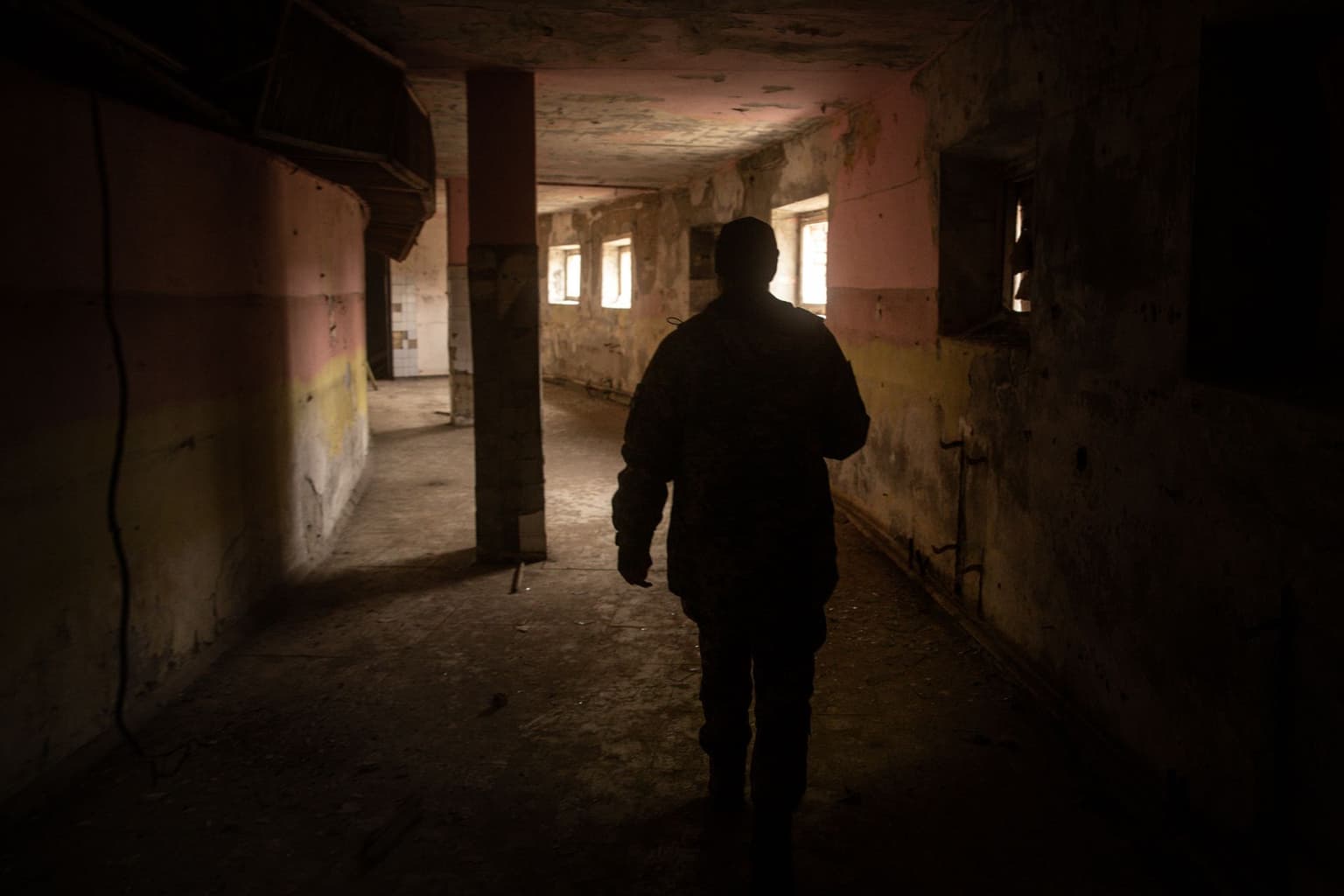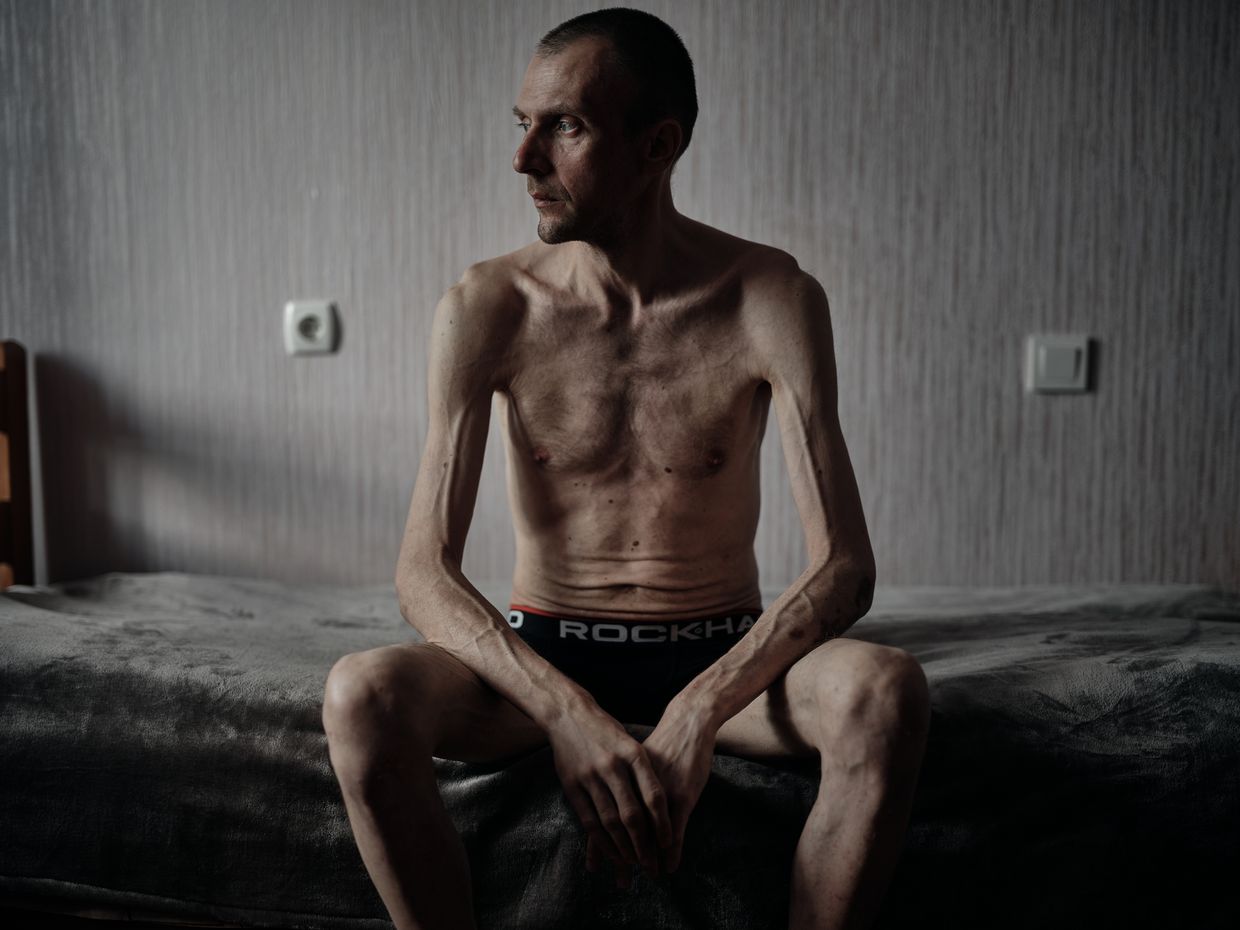Russia has tortured Ukrainian POWs for years. Now they're even more vulnerable

A member of the Ukrainian military walks through the basement rooms of a restaurant that locals say was used as a torture site by Russian forces during their occupation of Snihurivka, Mykolaiv Oblast, Ukraine, on Nov. 23, 2022. (Chris McGrath / Getty Images)
Nestor Barchuk
Nestor Barchuk is a servicemen of the 1st Corps Azov of the National Guard of Ukraine and a lawyer specializing in international advocacy for the release of prisoners of war and the investigation of the war crime committed at a penal colony in Russian-occupied Olenivka.
On Sept. 29, 2025, Russian President Vladimir Putin signed a law withdrawing from the European Convention for the Prevention of Torture, symbolically making Russia the first country in history to abandon this anti-torture pact.
Russia’s government attempted to present the withdrawal as a matter of “procedural fairness.” Moscow claimed it was forced out because the Council of Europe had denied Russia participation in the governing committee of the European Committee for the Prevention of Torture (CPT). This explanation is cynical at best, as the Council of Europe expelled Russia in 2022, specifically due to the full-scale invasion of Ukraine. To argue now that exclusion from the CPT’s work is “discriminatory” is pure hypocrisy. The true motivation lies elsewhere: shielding itself from scrutiny and closing off avenues for accountability.
The timing of Russia’s withdrawal is no coincidence. It comes precisely when evidence of torture against Ukrainian prisoners of war and civilian detainees has become overwhelming. The released Ukrainian POWs have described consistently facing beatings, electrocution, starvation, and other forms of abuse while in captivity. The UN Monitoring Mission in Ukraine has reported that over 95% of Ukrainian POWs endured torture in Russian captivity. The Independent International Commission of Inquiry confirmed that such practices are widespread and systematic. This is not random brutality – it is a deliberate Russian state policy.
What changes now
By withdrawing from the Convention, Russia has legally shut the door on international monitors from the CPT. Previously, as a party to the convention, Russia had to allow these visits “without restrictions.” However, since Russia’s exit from the Council of Europe in 2022, no CPT visits have actually taken place. The withdrawal makes this lack of access permanent and official.
The International Committee of the Red Cross already faces severe restrictions on access to Ukrainian prisoners. The CPT could have provided an additional layer of scrutiny. Russia’s withdrawal is therefore not a technicality but a deliberate act of isolation, designed to ensure that torture is away from any independent oversight. The Institute for the Study of War assessed the move as part of a broader strategy to worsen abuses against POWs. The European External Action Service condemned it as proof of Russia’s disregard for human rights.
This decision fits a broader pattern. Since its aggression against Ukraine, Russia has steadily dismantled its commitments to international law:
- Expulsion from the Council of Europe (2022) due to aggression against Ukraine
This was a major break: it meant Russia also ceased to be a party to the European Convention on Human Rights (ECHR). Moscow refused to implement the judgments of the European Court of Human Rights, but also passed laws declaring them void.
- Denouncing other Council of Europe treaties
After 2022, Russia began reviewing all the Council of Europe treaties it had joined since the 1990s. Putin has made a habit of withdrawing from those agreements, under the pretext of “Western hostility,” but with the clear aim of eliminating external checks on Russian conduct.
- Ignoring U.N. mechanisms
While Russia remains party to core U.N. human rights treaties, like the Convention Against Torture, it has shown disdain for U.N. oversight as well. The Kremlin’s stance is that Western nations politicize human rights to undermine Russia. This attitude extends to war-crimes accountability: Russia does not recognize the jurisdiction of the International Criminal Court (ICC).
Each step is calculated. Each step reduces accountability. Each step makes torture and abuse easier to hide.
Why did Russia do this?
The most straightforward explanation is that Russia wants to hide ongoing abuses. If torture and brutal mistreatment are indeed a state-orchestrated policy, as much evidence indicates, then allowing international inspectors in would expose these crimes.
For the Kremlin, the withdrawal is a way to separate from the “hostile” West or, say, “pivot away” from Europe towards the “dictatorship axis.” Putin has long promoted the narrative that Western institutions, such as the Council of Europe, are biased and seek to constrain Russia. According to this logic, Russia will not be “dictated to” by outsiders on how to run its prisons or deal with so-called “extremists” or “terrorists.”
Russia’s exit from the anti-torture convention is a stark declaration: the Russian state will act as it pleases and reject the oversight that might restrain its worst impulses.
In practice, these labels are often applied to POWs, such as the servicemen of the Azov Brigade. Russia has designated Azov as a terrorist organization and sentences its members to decades or even life imprisonment for defending the homeland, in blatant violation of the Geneva Convention relative to the Treatment of Prisoners of War.
It mocks the very idea of universal human rights, replacing law with the logic of force. And Russia knows that the immediate consequences will be negligible. Already sanctioned and isolated, Moscow calculates that one more withdrawal will cost it little while securing total control over what happens inside its prisons.


This situation once again brings us back to the debate about the inability of the post–World War II system of international humanitarian law to ensure compliance. The civilized world has no clear answer to the question of what to do when the world’s largest nuclear power openly withdraws from conventions, grossly violates human rights, and waves its nukes in our face.
What does this mean going forward?
Given Russia's expulsion from the Council of Europe in 2022 and Moscow’s refusal to implement the rulings of the European Court of Human Rights, withdrawing from the European Convention for the Prevention of Torture became the next logical step. The most direct consequence of this decision is that POWs in Russia are now even more vulnerable. This could lead to more frequent and more severe torture – a chilling prospect, given that torture in Russia is already systematic.
For international law, this withdrawal sends a message that a major power can simply opt out of monitoring mechanisms when they become inconvenient and face no consequences. This undermines the integrity of international human rights systems, which rely on good faith participation.
Nonetheless, Russia remains bound by general international law prohibiting torture – a norm considered binding on all nations. Even if Moscow rejects European oversight, it cannot lawfully legitimize torture. In theory, Russia could still face accountability through other avenues such as U.N. mechanisms or international tribunals regarding war crimes. In practice, without access and without cooperation, enforcement mechanisms are toothless. At the same time, Russia calculates that it can rely on an alliance with states that are indifferent to human rights such as Iran or North Korea.
Russia’s decision to quit Europe’s anti-torture convention is both a symbolic gesture of defiance and a concrete step with grave human rights consequences. In the end, Russia’s exit from the anti-torture convention is a stark declaration: the Russian state will act as it pleases and reject the oversight that might restrain its worst impulses.
The world is left to face a harsh reality – Russia once again said “yes” to torture, and even by formally removing the safeguards designed to prevent abuse, it is trying to normalize a world where power is unchecked, oversight irrelevant, and human rights optional.










